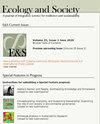加拿大纽芬兰和拉布拉多河生态恢复的成功:经验教训
IF 3.2
2区 社会学
Q1 ECOLOGY
引用次数: 0
摘要
尽管每年花费数百万美元用于恢复退化的河流生态系统,但对项目生态效益的评估相对较少。以证据为基础的综合描述了纽芬兰和拉布拉多的河流恢复活动。该综合报告确定了1949年至2020年间170个河流修复项目。对91个项目的子集进行了从业者调查,以评估生态成功。当管理者的感知成功与生态成功的独立评估进行比较时,82%的受访者认为项目是完全或部分成功的,而只有41%的项目通过独立评估被评估为生态成功。只有11%的从业者的评估使用了生态指标,但66%的项目管理者报告河流生态系统得到了改善。这种矛盾揭示了缺乏证据的应用,以支持实践者基于价值的判断。尽管报告说在评估中使用了监测数据,但值得怀疑的是是否进行了任何有意义的生态评估。如果我们要提高河流修复的科学水平,项目必须展示生态成功的证据,才有资格成为健全的修复。河流恢复是确保河流生态系统可持续性的必要手段。本研究中进行的评估表明,我们在规划、设计、实施、监测和评估项目方面的方法需要改进。需要一种综合系统的观点,关注利益相关者的价值观和关于替代恢复行动对关键生态系统指标的潜在后果的科学信息。本文章由计算机程序翻译,如有差异,请以英文原文为准。
The ecological success of river restoration in Newfoundland and Labrador, Canada: lessons learned
Despite millions of dollars being spent annually to restore degraded river ecosystems, there exist relatively few assessments of the ecological effectiveness of projects. An evidence-based synthesis was conducted to describe river restoration activities in Newfoundland and Labrador. The synthesis identified 170 river restoration projects between 1949 and 2020. A practitioner’s survey was conducted on a subset of 91 projects to evaluate ecological success. When the perceived success of managers was compared to an independent assessment of ecological success, 82% of respondents believe the projects to be completely or somewhat successful whereas only 41% of projects were evaluated as ecologically successful through an independent assessment. Only 11% of practitioners’ evaluations used ecological indicators, yet managers of 66% of projects reported improvements in river ecosystems. This contradiction reveals a lack of the application of evidence to support value-based judgments by practitioners. Despite reporting that monitoring data were used in the assessment it is doubtful that any meaningful ecological assessment was conducted. If we are to improve the science of river restoration, projects must demonstrate evidence of ecological success to qualify as sound restoration. River restoration is a necessary tool to ensure the sustainability of river ecosystems. The assessment conducted in this study suggests that our approach to planning, designing, implementing, monitoring, and evaluating projects needs to improve. An integrated-systems view that gives attention to stakeholders’ values and scientific information concerning the potential consequences of alternative restoration actions on key ecosystem indicators is required.
求助全文
通过发布文献求助,成功后即可免费获取论文全文。
去求助
来源期刊

Ecology and Society
环境科学-生态学
CiteScore
6.20
自引率
4.90%
发文量
109
审稿时长
3 months
期刊介绍:
Ecology and Society is an electronic, peer-reviewed, multi-disciplinary journal devoted to the rapid dissemination of current research. Manuscript submission, peer review, and publication are all handled on the Internet. Software developed for the journal automates all clerical steps during peer review, facilitates a double-blind peer review process, and allows authors and editors to follow the progress of peer review on the Internet. As articles are accepted, they are published in an "Issue in Progress." At four month intervals the Issue-in-Progress is declared a New Issue, and subscribers receive the Table of Contents of the issue via email. Our turn-around time (submission to publication) averages around 350 days.
We encourage publication of special features. Special features are comprised of a set of manuscripts that address a single theme, and include an introductory and summary manuscript. The individual contributions are published in regular issues, and the special feature manuscripts are linked through a table of contents and announced on the journal''s main page.
The journal seeks papers that are novel, integrative and written in a way that is accessible to a wide audience that includes an array of disciplines from the natural sciences, social sciences, and the humanities concerned with the relationship between society and the life-supporting ecosystems on which human wellbeing ultimately depends.
 求助内容:
求助内容: 应助结果提醒方式:
应助结果提醒方式:


